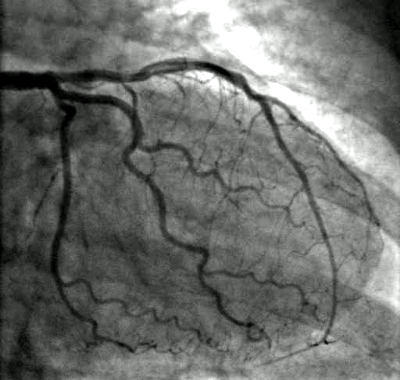“Do All Patients Get A Cardiac Catheterization Before Heart Surgery?” Asks Denise
By Adam Pick on March 27, 2011
Yesterday, I spoke with Denise, a 44 year-old patient suffering from severe mitral regurgitation disorder. She asked me, “Adam – The first surgeon I met with has yet to request a cardiac catheterization. Is that normal? I thought all patients got heart caths before surgery?”
First… Great question Denise!
Second… For those of you unfamiliar with this diagnostic test, I have posted a video below which describe a cardiac catheterization, commonly referred to as heart maths.\
Third… So you know, I did not have a cardiac catheterization prior to aortic valve replacement surgery. Given my age, risk factors and echocardiogram, Dr. Starnes did think it would enhance the diagnosis, the prognosis or the surgical approach specific to the aortic valve stenosis and aortic regurgitation in my diseased valve.

Picture of Heart During Cardiac Catheterization
Finally… Given my interactions with thousands of patients over the years, I’m not alone. That said, I also know that many, many, many patients that did get cardiac catheterizations prior to surgery. In fact, here is a patient story from Ken about his cardiac catherization.
I hope that helps Denise (and perhaps you) learn more about cardiac catheterizations. Did you get a heart cath? If so, feel free to leave a comment below.
Keep on tickin!
Adam
|
jerry says on March 27th, 2011 at 12:09 pm |
|
I had one at 49. I forget what the alternatives were, but I do recall thinking it would give the most accurate results and what my cardiologist recommended. |
 |
|
Ken Fleming says on March 27th, 2011 at 1:32 pm |
|
I have had 3 caths.Two for by pass surgery, now at eight bypasses |
 |
|
ROCHELLE HAMMER says on March 27th, 2011 at 1:32 pm |
|
two years ago i had a aortic valve replacement. i had a cardiac catheterization a week or so before the operation. it showed my arteries were clear and i had valve stenosis. the test was not painful or uncomfortable. i was 62 when this was done.i was glad i had it done. |
 |
|
MJ Samer says on March 27th, 2011 at 1:45 pm |
|
I also had a cardiac catheterization a month or so before my heart valve replacement surgery on the recommendation of my cardiologist. That was at Northwestern Memorial Hospital in Chicago in fall ’09. |
 |
|
Frank says on March 27th, 2011 at 1:59 pm |
|
I had a heart cath the day prior to my aortic valve replacement surgery, not so much for the diagnosis on my valve, but to determine if anything else should be done during the surgery. They found a mildly clogged artery that they decided to bypass while doing the valve replacement. |
 |
|
Shari says on March 27th, 2011 at 2:40 pm |
|
Yes, Adam, my cardiologist performed one just a few weeks after the decision I would need to move forward with surgery, and about 2 weeks prior to my meeting my surgeon. I don’t know the pros and cons, or why some physicians would want to do it and others not, but I can tell you that I felt an additional sense of relief and confidence knowing that my arteries, veins and all other parts of my cardiac system were working well. My surgeon also did a TEE (transesophageal echocardiogram) at the same time. |
 |
|
susan says on March 27th, 2011 at 2:41 pm |
|
I had one the day before my surgery and then stayed overnight in the hospital. I am 56 and gave my surgeon a clearer picture with regards to the status of my heart. he also made sure no additional work needed to be done. My GP and Cardiologist both felt this was SOP |
 |
|
Diana says on March 27th, 2011 at 3:05 pm |
|
I had mitral valve repair at age 43 and did get a cardiac cath before surgery. It made sense to me as I would hate to find out a few years later I needed bypass surgery also. |
 |
|
Tim Mangum says on March 27th, 2011 at 4:32 pm |
|
When I had my AVR last year at Duke they wanted a cath the day prior to surgery. Dr Glower told me that if anything else showed up on the cath (ex. blockage, etc.), they would take care of it during the AVR. Thankfully, nothing showed up and I had a minimally invasive incision instead of having my chest cracked. |
 |
|
Ricky (a female) says on March 27th, 2011 at 5:17 pm |
|
Yes, I had a heart cath prior to Mitral Valve (mechanical) replacement.That was over 8 years ago and I was 47. |
 |
|
Robert Baker says on March 27th, 2011 at 6:40 pm |
|
I had a heart cath the day prior to my aortic valve replacement surgery.I was told by my Cardiologists it was the gold standard in dignosing my valve but also to determine if anything else needed to be done. The procedure was not painful and gave me the knoledge that my artries are clear. |
 |
|
Lisa says on March 27th, 2011 at 9:29 pm |
|
I had mitral valve surgery at the age of 35 and did NOT have a cath done prior to my repair. I did have a very detailed cardiac CT scan. I am sure had there been any artery problems show up on the scan a cath would have also been performed, my arteries were clean and the valve was as expected, so they only did the CT. |
 |
|
Cindy McGinn says on March 28th, 2011 at 7:20 am |
|
I had a heart cath about a week before my aortic valve replacement surgery. I had had an echocardiogram about 2 weeks prior to that. My cardiologist said that the echo showed extreme narrowing of the valve but my symptoms did not reflect that at all. He wanted the heart cath to determine if the symptoms I presented or the echo reflected my condition more accurately. As others mentioned above it was beneficial; they found a ‘minor’ artery that was 50% blocked so they corrected that to prevent future issues. I was very nervous about the heart cath. It ended up being very easy to get through, no discomfort to speak of, and it removed any question about what my path would be. |
 |
|
Charlie Swinburn says on March 28th, 2011 at 9:12 am |
|
I had a heart cath prior to my robotic surgery to repair my mitral valve. My understanding is that having relatively clear arteries was required for robotic surgery (at Mayo) because if they had to also do a bypass they couldn’t do it robotically. |
 |
|
Tim Purnell says on March 28th, 2011 at 9:40 am |
|
I had Mitral valve repair last year at age 33 and I had a heart cath performed a few weeks prior to the surgury. The clip that they used in my groin to close off the artery after surgery was one of the most painful things I have endured in my life-probably worse than the heart surgery itself. I had no sedation at all during this procedure or for the heart cath-not recommended! |
 |
|
Carmen "Dixie" Downey says on March 28th, 2011 at 10:01 am |
|
I had a cardiac cath. done two days before my schdeuled heart surgery to replace mitral and aorta valves. The purpose was to make sure that my heart vessels didn’t need replacement too…..and they didn’t…..I ended up with only the aorta valve being replaced. The mitral valve was calcified into the heart muscle. The surgeon stated he couldn’t removed the valve and cut into the heart muscle for that couldn’t be repaired. He did do a MAZE procedure…………I was 80 yrs. old at the time of this surgery. |
 |
|
Patricia says on March 28th, 2011 at 10:05 am |
|
My husband had two caths prior to surgery. They were years apart but the cath allowed the doctor to see the exact condition of his aortic valve. Surgery was not required at first–not until 6 years later, after the second cath confirmed that his condition had deteriorated to the point where surgery was absolutely required. |
 |
|
Don Hull says on March 28th, 2011 at 1:33 pm |
|
I had a cardiac catheterization about two weeks before my valve surgery. My surgeon in Nashville (two hours away from my home cardiologist) said he didn’t want any surprises. My home cardiologist did it and I watched the procedure. There was no pain, maybe a little discomfort, and one night in the hospital. I’d do it again in a heartbeat! |
 |
|
Ricky (a female) says on March 28th, 2011 at 6:11 pm |
|
Hi DIXIE,YOU KEEP TICKIN lady……I’d love to meet you.You are what |
 |
|
john O'Neill says on March 28th, 2011 at 8:02 pm |
|
Two years ago I had my cath done imediately before my surgery for Aortic valve replacement and anerism repair with a dacron graft at the Mayo Clinic. I didn’t feel a thing or remember anything about it. All I remember is being told as they moved me from the cath lab to surgery that I would have to have one bypass along with everything else. I also heard one of the doctors telling my kids that they needed to be checked for bycuspid aortic valve. I didn’t have to deal with any of the restrictions after the cath as I was in surgery. I wonder why everyone doesn’t do it this way. The site in my groin was worse than my chest in that it was swollen and bruised badly and I had numbness in my leg that lasted a couple of months. |
 |
|
Kathy Arnot says on March 29th, 2011 at 12:04 am |
|
Is a angigram the same as what your talking about ? |
 |
|
Duane Hunt says on March 29th, 2011 at 2:19 pm |
|
A had a (my first and only) heart cath scheduled the day before my mitral valve repair surgery. I entered the hospital, had the cath, spent the night, and then had my surgery the next morning. |
 |
|
Mark Reid says on March 31st, 2011 at 7:48 am |
|
Hi Adam, Yes my cardiologist performed one just a few weeks after the decision I would need to move forward with surgery for an aortic valve replacement. I don’t know the pros and cons, or why some physicians would want to do it and others not, but I can tell you that I felt an additional sense of relief and confidence knowing that my arteries, veins and all other parts of my cardiac system were working well so it is good to have all this checked out seeing that they will be in a position to do a by-pass if required. In Australia the cardiologists refer to the procedure as a angiogram. |
 |
|
Bonnie Perman says on April 4th, 2011 at 9:02 pm |
|
I had my cath done two weeks prior to mitral valve repair surgery. They performed the cath through the radial artery in my wrist to avoid any issues with the groin. I remember nothing and was able to get up and leave the hospital after only 2.5 hours post cath. My arteries were clear and my mibd was at ease. It was the absolute best way to go. |
 |
|
Ted Waterman says on April 13th, 2011 at 10:00 pm |
|
I had my aortic valve replaced in August last year(age 67) at Brigham & Womens Hospital “BWH” in Boston. I had a Cardiac CAT-Scan that showed no coronary blockages but did show my heart had grown some blood vessels close to the Aortic valve. This information resulted in our decision to do a full sternotomy rather than a partial sternotomy. My experience at BWH was great! Ted |
 |
|
Barbara San Antonio says on June 23rd, 2011 at 3:25 pm |
|
I just found out after 5 years that there are clips in my left wrist where a doctor did a catherization for my heart…Why are the clips still there,or should have they been taken out after the testing ?? |
 |
|
Bonnie Perman says on June 23rd, 2011 at 4:27 pm |
|
I had no clips in my wrist post cath which took place last September 2010. |
 |
|
Tim Mangum says on August 9th, 2012 at 4:58 pm |
|
I have had a total of 3 caths so far. I had one after I was diagnosed with bicuspid aortic valve in 2007. When I had my AVR in May, 2010, I had a cath done the day before my surgery. I recently had another cath due to some problems and so far all of them show no blockages. The AVR surgeon wanted the cath done so he would know ahead of time if a CABG would be necessary in which case he would have switched from a minimally invasive procedure to a full blown median sternectomy. |
 |
|
Raman Shanker says on August 9th, 2012 at 11:11 pm |
|
My aortic stenosis has been monitored by echocardiography for more than ten years. Finally I had some dizziness attacks and sure enough the Echo showed “severe stenosis” So I had a cardiac cath in May 2012 which confirmed the severity of the stenosis and my coronary arteries were basically normal except for one or two barely narrower spots. I am now going to Johns Hopkins hospital to see another cardiologist and have surgery within the next few weeks. They cannot tell whether I have a Bicuspid Aortic valve due the severe calcification. However I strongly suspect it is, as, my son who is 40 years old showed Bicuspid Aortic vale on a routine Echo. |
 |
|
Barbara says on August 10th, 2012 at 2:58 pm |
|
I had my aortic valve replaced in March this year after, by chance, finding it was bi-cuspid and had severe stenosis 4 years ago. I had no symptoms at all until beginning to get slightly breathless on exercise shortly before my op. I had an angiogram a week or so before my op which showed my arteries were all clear. I found that I needed a pacemaker fitted a week after my op because of damage caused in scraping away the calcification around my old valve. At no time was I ever warned that this might be a possibility. I have also suffered some permanent kidney damage – again as a direct result of the op and again this came as a complete bombshell to me. Please be aware that these are quite common (I’m now told) complications when undergoing valve surgery. |
 |
|
Barbara Parker says on August 10th, 2012 at 4:50 pm |
|
I Have had heart caths before each operation, But I also have other problems besides needing the value replaced or fix, as I had a hole between the two ventricles of the heart that has been fixed, I was born with it. I need the pulmary value fixed now. which I have not heard anybody else talking about, I not had any problems with the heart caths. I am 72 years old. |
 |
|
Tom Haynie says on August 10th, 2012 at 9:54 pm |
|
I had an angiogram that was the definitive test for aortic stenosis, the “gold standard” as my cardiologist called it. The stress tests and echo were early indicators, but the heart cath gave my doctor and I what we needed to move firmly and quickly ahead with surgery. In fact, it was this test that caused my doctor to recommend AVR surgery “in weeks, not months” because my disease was progressing faster than anyone thought. That was in late 2008. I had another angiogram the end of 2011 to diagnose the cause of a stroke. It was comforting to learn that my heart was in great shape and we had the angiogram results to prove it. We never could find what caused my stroke, but I recovered fully in about a week following ATP treatment, another of medicine’s miracles. |
 |












